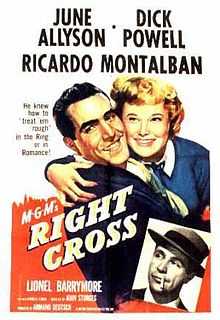Right Cross
| Right Cross | |
|---|---|
 Theatrical release poster | |
| Directed by | John Sturges |
| Produced by | Charles Schnee |
| Written by |
Armand Deutsch William Inge |
| Starring |
June Allyson Ricardo Montalban Dick Powell |
| Music by | David Raksin |
| Cinematography | Norbert Brodine |
| Editing by | James E. Newcom |
| Distributed by | MGM |
| Release dates | November 15, 1950 |
| Running time | 90 minutes |
| Language | English |
| Budget | $873,000[1][2] |
| Box office | $1,302,000[1] |
Right Cross is a 1950 drama film directed by John Sturges, written by Armand Deutsch and starring June Allyson, Ricardo Montalban, Dick Powell, Lionel Barrymore, and (in a small role) Marilyn Monroe.
Plot
In a wheelchair now, old-time prizefight promoter Sean O'Malley is down and almost out. He has one good boxer left, Johnny Monterez, who also has been seeing his daughter, Pat.
Pat needs to take over the business. When she goes to training camp, Johnny's hand is seriously injured in a sparring bout. Johnny asks a doctor to keep his condition a secret. Pat, meanwhile, searches for old friend Rick Garvey, a sportswriter with a drinking problem, and finds him in jail.
Johnny's young cousin Luis is also in jail and needs $200. Johnny defects to another promoter, Allan Goff, which leaves Pat feeling betrayed personally and professionally. Johnny also insults Rick, who is offended by some of Johnny's personal beliefs and comments.
Sean O'Malley dies, leaving Johnny feeling ashamed for abandoning him. Johnny ends up taking a dive in the big fight, but is once again a standup guy with Pat and Rick.
Cast
- June Allyson ... Pat O'Malley
- Dick Powell ... Rick Garvey
- Ricardo Montalban ... Johnny Monterez
- Lionel Barrymore ... Sean O'Malley
- Teresa Celli ... Marina Monterez
- Barry Kelley ... Allan Goff
- Tom Powers ... Tom Balford
- Mimi Aguglia ... Mom Monterez
- Marianne Stewart ... Audrey
- John Gallaudet ... Phil Tripp
- Wally Maher ... First Reporter
- Larry Keating ... Second Reporter
- Kenneth Tobey ... Ken, the Third Reporter (as Ken Tobey)
- Bert Davidson ... Fourth Reporter
- Marilyn Monroe ... Dusky Ledoux (uncredited)
Music
The dramatic score for the film was composed by David Raksin and was conducted by Raksin and Johnny Green. His music, exclusive of source music written by others, consisted only of music for the main and end titles, and one short piece in the first reel.[3]
Raksin's music was issued on cd in 2009, on Film Score Monthly records.
Reception
According to MGM records, the film earned $955,000 in the US and Canada and $347,000 elsewhere leading to a $64,000 loss for the studio.[1]